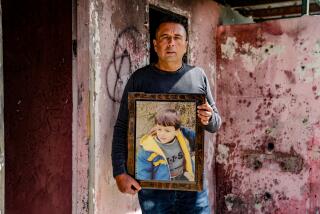Actress Enjoys Latest Role as Author
- Share via
Actress Diane Shalet began to rehearse the role of a recently widowed woman. The petite, strawberry-blonde sipped a glass of lemonade while gazing across the street at two Jehovah’s Witnesses. The widow watched the couple as they walked from house to house, knocking on doors. They looked at her house and approached. Looking a bit surprised and unsure of what to do, the widow decided to let them in. She opened the door, welcoming their company.
Satisfied with the scene, Shalet did not go before the cameras to shoot a take. She sat down at her typewriter and pounded out a chapter.
That is literally how all the characters in Shalet’s new book, “Grief in a Sunny Climate,” came to life.
The book, which chronicles the often-comedic experiences of a widow in her 40s trying to get her life back on track after the death of her husband, is Shalet’s first venture as a novelist. Instead of waiting for divine inspiration to help her create characters and scenarios, once she had an idea, she acted it out at home using props. Shalet wrote only if, after performing a scene, it seemed realistic.
“I wasn’t trained as a writer and the process of putting lives and lines on paper intimidated me,” said Shalet, a veteran actress who divides her time between West Hollywood and New York City.
Although she has landed countless roles in plays, radio, television and feature films during her 30-year career, writing was a private hobby--nothing she had ever considered doing professionally.
But the shift in careers has proved to be successful. Released by St. Martin’s Press in June, Shalet’s book has been praised by critics. The New York Times lauded her in a recent book review for crafting a “deceptively silly story to disguise some serious lessons about sorrow and dependency.”
Figuring out how to develop her story line and characters was the biggest challenge for Shalet. When she first began writing what eventually became “Grief in a Sunny Climate,” she said she had no intention of becoming an author.
The book is loosely based on her own experience. Like the protagonist Babe, Shalet had a hard time dealing with her husband’s death. After Shalet’s spouse of 11 years died more than a decade ago, she roamed bookstores looking for self-help texts to guide her through grieving.
But the books she found offered her no comfort, so she began keeping a journal instead. During that time, she also joined a Santa Barbara-based writers group to learn more about writing techniques--something she had always wanted to do but hadn’t had the time.
When Shalet mustered enough courage to share her journal entries with group members, they unanimously told her she had a novel in the works. Her entries read more like short stories, she was told, and the unfinished work was so impressive, she won the Santa Barbara Writers Conference first prize for fiction writing.
Yet instead of building her confidence, winning the award made her more insecure.
“I had a big block after I won the prize,” Shalet said. “It was like a burden on my shoulders. But those feelings finally exhausted themselves when I decided I had to . . . just have fun writing.”
To help her just have fun and get the creative juices flowing, Shalet used a tool that came more naturally to her--acting. She created mini stage settings complete with props and, using her improvisational skills, played all the parts herself.
“When your imagination takes over, you become a better writer,” she said.
Shalet’s comedic talents proved to be handy as well. She did not want Babe’s story to be one of merely tears and gloominess, so she has Babe go through a series of slapstick adventures on her journey of self-discovery.
“Grief is not neat,” Shalet explained. “It’s a loopy roller coaster” that takes one through a range of emotions--from sadness and despair to finding humor in mundane scenarios.
Shalet borrows a quote from British dramatist and critic George Bernard Shaw to describe her feelings about humor and bereavement: “Life does not cease to be funny when people die, any more than it ceases to be serious when people laugh.”
“We’ll go mad if we don’t laugh,” she said.
More to Read
Sign up for our Book Club newsletter
Get the latest news, events and more from the Los Angeles Times Book Club, and help us get L.A. reading and talking.
You may occasionally receive promotional content from the Los Angeles Times.










